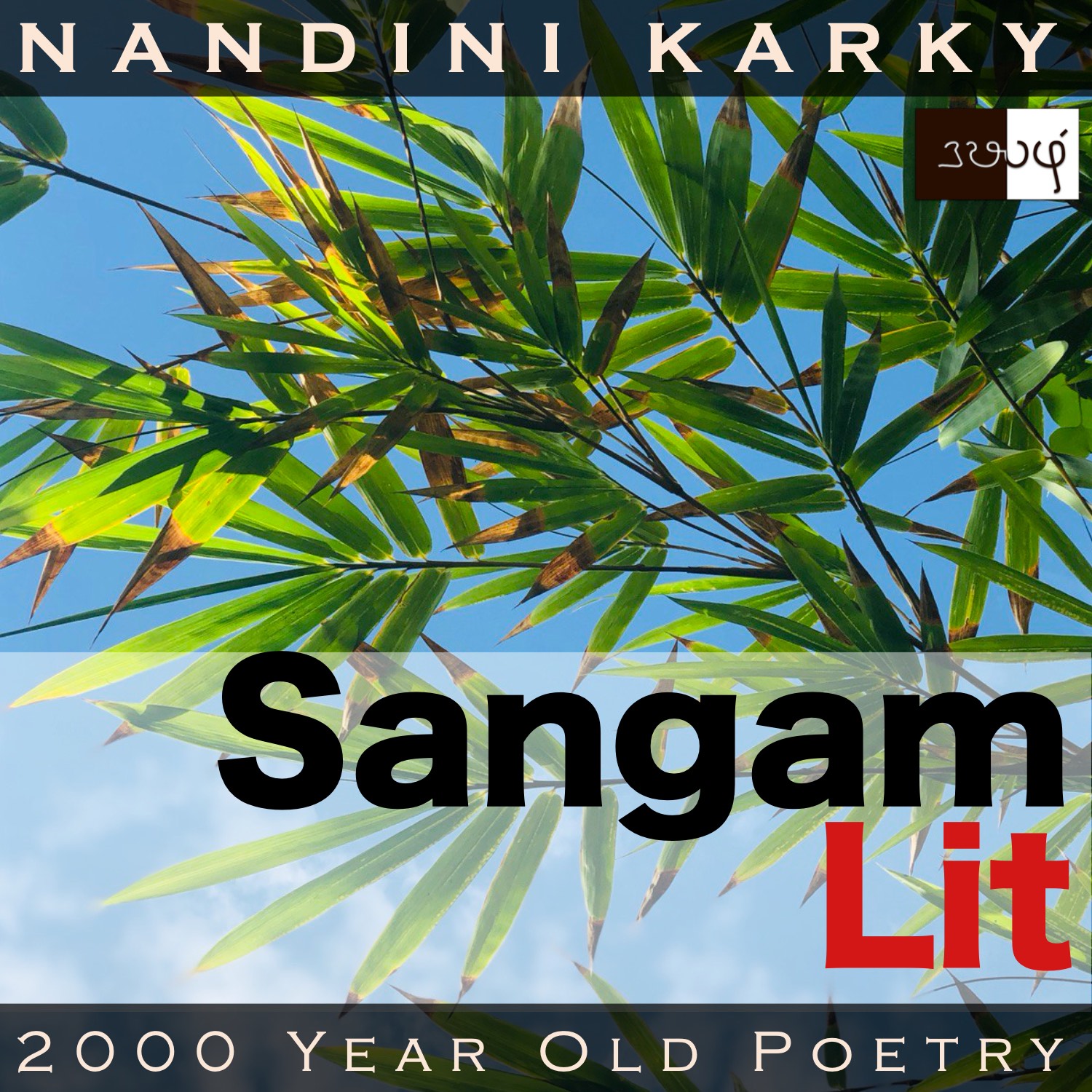Podcast: Play in new window | Download
Subscribe: Apple Podcasts | Spotify | Amazon Music | Android | iHeartRadio | TuneIn | RSS | More

In this episode, we perceive the vivid way a lady’s fears about her man’s parting are allayed, as portrayed in Sangam Literary work, Natrinai 256, penned by Paalai Paadiya Perunkadunko. Set in the drylands of ‘Paalai’ landscape, the verse speaks in the comforting voice of the man to his lady, promising not to part away from her.
நீயே பாடல் சான்ற பழி தபு சீறடி,
அல்கு பெரு நலத்து அமர்த்த கண்ணை;
காடே நிழல் கவின் இழந்த அழல் கவர் மரத்த,
புலம்பு வீற்றிருந்து நலம் சிதைந்தனவே,
இந்நிலை தவிர்ந்தனம் செலவே வைந்நுதிக்
களவுடன் கமழ, பிடவுத் தளை அவிழக்,
கார் பெயல் செய்த காமர் காலை,
மடப் பிணை தழீஇய மா எருத்து இரலை
காழ் கொள் வேலத்து ஆழ் சினை பயந்த
கண் கவர் வரி நிழல் வதியும்
தண்படு கானமும் தவிர்ந்தனம் செலவே.
Opening with ‘பாடல் சான்ற’ meaning ‘worthy of a verse’, the poem starts on meta-poetic note. What could be that thing that’s elevated so? Turns out it’s the ‘பழி தபு சீறடி’ meaning ‘flawless, small feet’! This fascination with women’s small feet seems to go on millennia later, as reflected from recent research studies on the same. From small feet, the poem travels to ‘பெரு நலத்து அமர்த்த கண்ணை’ referring to ‘wide and beautiful eyes’. In contrast to this image, we are presented with ‘அழல் கவர் மரத்த’ meaning ‘fire-scorched trees’ bringing the heat of summer in focus. The poem depicts the core theme in ‘தவிர்ந்தனம் செலவே’ meaning ‘I shall avoid travel’. Sounds like a promise the world entire has made in recent times! Just when we were thinking we are in the thick of summer, the verse instantly transports us to ‘the heavy downpour of rains’ in ‘கார் பெயல்’. When rains are here, flowers chime in to mark their attendance too, in ‘பிடவு’ or ‘wild jasmine’ flowers. A fruiting tree gives company in ‘களவு’ also called as the ‘karanda’ tree. The plant life is complemented by the denizens of the animal kingdom represented by the ‘இரலை’ or ‘buck’ and its mate, the ‘பிணை’. Another tree, the ‘வேலம்’ or the ‘Indian gum arabic tree’ completes the scene with its ‘கண் கவர் வரி நிழல்’ meaning ‘lined shade, pleasing to the eyes’. The verse ends by repeating the theme once again ‘தவிர்ந்தனம் செலவே’ meaning ‘I shall avoid travel’. Well, nothing’s stopping us from taking a mind trip to the land depicted in this ancient verse and off we go!
The man and lady had been leading a happy, married life when the man felt compelled to part away from the lady on a mission. The lady, perceiving the man’s intentions, turns worried and starts losing her health. Seeing the lady suffering, the man turns to her and says, “You are one with impeccable small feet, worthy of a song, and with well-set, big, beautiful eyes. But, the forest is one bereft of the beauty of shade with trees scorched by the burning sun, all standing apart and alone, with their form ruined. Considering this state, I have given up wanting to part away. Whereas on a picturesque, rainy morning, washed by the heavy downpour, the sharp-tipped ‘kalavu’ turns fragrant and the ‘pidavam’ buds burst open. Also, the black-necked male deer embraces the naive young female and stays in the alluring, line-filled shade of the hard-seeded ‘velam’ with low branches. So, I have given up wanting to part away to that cool forest too!” With these words, the man promises to the lady that he will not part from her, be it in the summer season then or in the rains to come.
Time to explore the verse in detail! The man starts his words to the lady by praising her beauty, which he sees in her small feet and big eyes. After mentioning the beauty that seems to be abundant at home, his eyes turn to the contrasting scene of the dried-up, lonely trees, robbed of their beauty, with leaves scorched by the raging fire of the summer sun. So, he declares that he would abstain from parting away in the summer. Thinking that the lady will worry that he will choose the rainy season instead, he decides to talk about the rains, when the sharp-tipped karanda tree sends out its fragrance and the wild jasmine opens its buds. He describes a rainy morning when the male deer embraces the female in the shade of the ‘velam’ tree. And, he declares that he shan’t part away, not just to that scorched forest but even to this cool and moist forest. The reason is that seeing the male deer in a happy embrace with its female, any man would stop in his tracks and yearn for the joy he has left behind at home. Predicting this moment of pain, the man assures the lady that even the coolness and beauty of the rains cannot persuade him to part from her.
Reading this poem, I was curiously reminded of a ‘meme’ that I read recently. The meme goes like this: ‘It’s been almost a week I and wife are working from home due to coronavirus situation. I think we will kill each other before the virus does!’ Nothing like humour to diffuse a tense situation, of course! However, placing this meme in parallel to the verse we just saw, isn’t the contrast stunning? From being couples, who could not bear to be apart even for a moment, we have turned into couples, who cannot bear the other even for a week! Perhaps, it’s time for both men and women to channel their inner-Sangam-mate and embrace the unexpected joys in these moments of togetherness!




Share your thoughts...